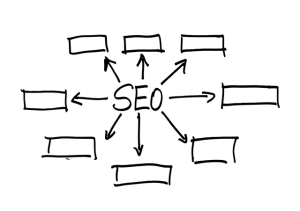In today's digital era, understanding SEO (Search Engine Optimization) is vital for businesses aiming to enhance their online presence. "SEO Tips for Ranking Higher" emphasizes a strategic approach, focusing on keywords, meta tags, headings, and backlink profiles. Effective SEO involves creating high-quality content, keyword research, and building authoritative backlinks to improve rankings and attract organic traffic. On-page optimizations, like unique content and mobile responsiveness, are crucial. Technical SEO, including site structure, sitemaps, and mobile optimization, enhances crawlability. Continuous monitoring using tools like Google Analytics allows for data-driven decisions and adjustments to keep up with algorithm updates, ultimately boosting search engine visibility.
In the digital age, SEO Tips for Ranking Higher are vital for online visibility. This article guides you through the essential components of search engine optimization (SEO), empowering you to navigate the complex landscape and elevate your website’s ranking. From comprehending the role of SEO in online visibility to mastering keyword research, optimizing on-page elements, building backlinks, addressing technical SEO considerations, and monitoring performance—each section offers actionable strategies for a robust SEO approach.
Understanding SEO and Its Role in Online Visibility

In today’s digital era, understanding SEO (Search Engine Optimization) is paramount for businesses aiming to increase their online visibility and reach their target audience effectively. SEO Tips for Ranking Higher involve a strategic approach to enhancing website content and structure so that search engines like Google can easily index and rank it higher in search results. By optimizing key elements such as keywords, meta tags, headings, and backlink profiles, websites can climb up the search engine rankings, thereby attracting more organic traffic.
Effective SEO goes beyond merely optimizing for algorithms; it also involves providing valuable content that meets the information needs of users. Search engines prioritize delivering relevant results to users, so creating high-quality, keyword-rich content that addresses common queries is essential. Additionally, building a robust backlink profile from authoritative sources signals to search engines that your website is trustworthy and worthy of higher rankings.
Keyword Research: The Foundation of Effective SEO

Keyword research is a fundamental step in any successful SEO strategy and serves as the bedrock upon which your entire optimization efforts are built. It involves understanding what terms and phrases your target audience uses when searching for products, services, or information related to your niche. By identifying these keywords, you can create relevant and valuable content that aligns with user intent. This process is crucial because it ensures your website appears in search engine results when users actively seek out topics connected to your business.
Effective keyword research allows SEO professionals to uncover a wealth of opportunities. It involves analyzing search volume, competition levels, and user behavior to select the most effective keywords. By incorporating these keywords naturally into your content, meta tags, and URL structures, you enhance your website’s relevance and visibility in search engine results pages (SERPs). This strategy, when executed properly, can lead to improved rankings for SEO tips for ranking higher, ultimately driving more organic traffic to your site.
Optimizing On-Page Elements for Search Engines

When it comes to optimizing your website for search engines, focusing on on-page elements is crucial for those seeking SEO tips for ranking higher. This involves ensuring that each page has relevant and unique content tailored to specific keywords. Crafting compelling titles, meta descriptions, and headers that incorporate these keywords can significantly impact your site’s visibility. Search engines scrutinize these elements to understand the context and purpose of your pages, so strategic use of keywords can boost your SEO efforts.
Additionally, optimizing images with alt tags, ensuring proper URL structures, and creating user-friendly content are vital. User experience plays a significant role in search engine rankings, so making your site easily navigable and mobile-responsive is beneficial. These on-page optimizations form the foundation for improving your website’s performance in organic search results.
Building High-Quality Backlinks: A Strategic Approach

In the quest for higher search engine rankings, SEO tips for ranking higher often revolve around building high-quality backlinks. These links from other websites act as votes of confidence in your content’s authority and relevance. A strategic approach involves targeting relevant, reputable sources that align with your niche. Identify industry leaders, influential blogs, and established websites that cater to your target audience.
Instead of focusing on quantity, prioritize quality. Engaging in outreach to build relationships with these sites can lead to natural, organic backlinks. Offer valuable content, such as insightful articles or unique research, that they’d be willing to share or link to. This strategic approach not only enhances your SEO but also fosters meaningful connections within your industry.
Technical SEO Considerations for Seamless Crawling

Technical SEO plays a pivotal role in ensuring your website is easily crawled and indexed by search engines, which is essential for improving your SEO tips for ranking higher. A seamless crawling process allows search engine algorithms to access and understand every page of your site, leading to better visibility in search results. One crucial aspect is optimizing your site’s structure. Creating a logical hierarchy with proper internal linking helps search engines navigate through your content efficiently. XML sitemaps also come in handy by providing a clear map of all the pages on your website.
Additionally, ensuring fast page load times is critical. Search engines favor sites that deliver content quickly, enhancing user experience. Optimizing images, minifying code, and leveraging browser caching are effective strategies to speed up your site. Mobile-friendliness is another significant factor; with more users accessing the web through mobile devices, search engines prioritize mobile optimization, ensuring your website adapts seamlessly to various screen sizes. These technical SEO considerations form a solid foundation for improving your site’s crawlability and, consequently, its overall ranking potential.
Monitoring and Analyzing Your SEO Performance

Staying informed is key in the dynamic world of search engine optimization (SEO). Monitoring and analyzing your website’s performance is an essential SEO tip for ranking higher. Utilize tools like Google Analytics to track your site’s traffic, user behavior, and conversion rates. Identify which pages are performing well and which ones need improvement. Regularly review your search engine rankings for targeted keywords using tools like Google Search Console. This data will help you make informed decisions about optimizing content, improving site speed, enhancing mobile usability, and adjusting your overall SEO strategy to climb the ranks.
By continuously monitoring your SEO performance, you can quickly identify areas where your efforts are paying off and where they need tweaking. This iterative process allows you to refine your approach, stay ahead of algorithm updates, and ultimately, achieve better search engine visibility for your website. Remember, consistent analysis is a powerful SEO tip that can significantly impact your online presence and drive more organic traffic to your site.
